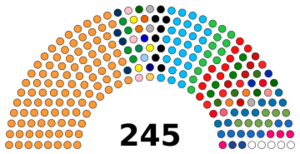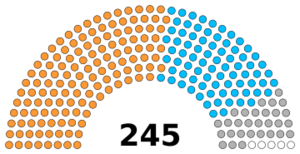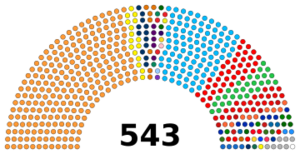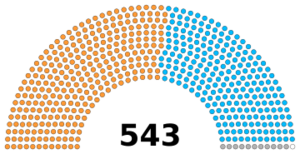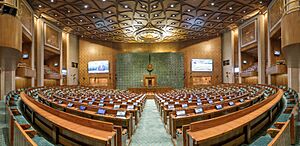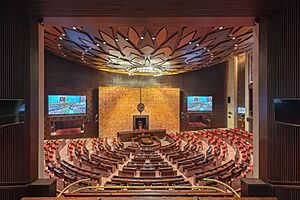Parliament of India facts for kids
Quick facts for kids Parliament of IndiaBhāratīya Saṁsad |
|
|---|---|
 |
|
| Type | |
| Type | |
| Houses | Rajya Sabha (Council of States) Lok Sabha (House of the People) |
| History | |
| Founded | 26 January 1950 |
| Preceded by | Constituent Assembly of India |
| Leadership | |
|
Droupadi Murmu
Since 25 July 2022 |
|
|
C.P. Radhakrishnan
Since 12 September 2025 |
|
|
Om Birla
Since 19 June 2019 |
|
| Structure | |
| Seats | 788 245 Members of Rajya Sabha 543 Members of Lok Sabha |
|
Rajya Sabha political groups
|
|
|
Lok Sabha political groups
|
|
| Elections | |
| Single transferable vote | |
| First-past-the-post | |
|
Rajya Sabha last election
|
2025 |
|
Lok Sabha last election
|
19 April – 1 June 2024 |
|
Rajya Sabha next election
|
2026 |
|
Lok Sabha next election
|
By May 2029 |
| Meeting place | |
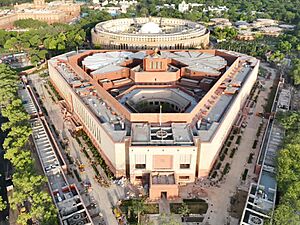 |
|
| Sansad Bhavan 118, Rafi Marg, New Delhi Delhi, India – 110001 |
|
| Constitution | |
| Constitution of India | |
The Parliament of India is the most important law-making body for the Republic of India. It is like a big team with two main parts: the Rajya Sabha (which means Council of States) and the Lok Sabha (which means House of the People). The President of India is the head of this law-making team. The President can call meetings or end them, but they always listen to the advice of the Prime Minister and other government ministers.
People who are chosen or nominated to be part of Parliament are called Members of Parliament (MPs). Citizens of India directly vote for MPs in the Lok Sabha. For the Rajya Sabha, MPs are chosen by elected members from state assemblies. The Parliament has 543 members in the Lok Sabha and 245 in the Rajya Sabha. This includes 12 members nominated by the President for their special skills in areas like art or science. The Parliament meets in a special building called Sansad Bhavan in New Delhi. India's Parliament represents the largest group of voters in the world. On May 28, 2023, Prime Minister Narendra Modi opened the new Parliament Building, which is right next to the old one.
Contents
- India's Parliament: A Look at Its History
- Parliament Buildings: Old and New Homes
- How India's Parliament is Organized
- Parliament's Important Powers
- Parliament Sessions: When Lawmakers Meet
- How Laws are Made: Legislative Functions
- Parliamentary Committees: Working Behind the Scenes
- Special Rights for Members of Parliament: Privileges
- Rules for MPs: Code of Conduct
- Protecting Parliament: Security Incidents
- Images for kids
- See also
India's Parliament: A Look at Its History
During the time when India was ruled by the British, the main law-making group was called the Imperial Legislative Council. This group was created in 1861 and stopped working in 1947 when India became independent. After independence, a special group called the Constituent Assembly of India was formed to write the Constitution of India. Once the Constitution was ready in 1950, the Constituent Assembly finished its work. Then, the Parliament of India, which we know today, took over and has been working ever since.
Parliament Buildings: Old and New Homes
India's Parliament has had two important homes in New Delhi. Both buildings are called Sansad Bhavan.
The Old Parliament House: Samvidhan Sadan
The Old Parliament House, also known as Samvidhan Sadan, was designed by famous architects Edwin Lutyens and Herbert Baker. They were in charge of planning and building New Delhi for the British government. This building was meant to be the home for different legislative groups. It took six years to build and was opened on January 18, 1927.
The old building is about 70 feet tall and 560 feet wide. It covers a large area of about 5.66 acres. Inside, there's a big Central Hall, along with the meeting rooms for the Lok Sabha and Rajya Sabha, and a library. Around these rooms, there's a circular structure with four floors. This area provides offices for MPs, committees, and government ministries. The Central Hall is very important because the Indian Constitution was created there.
The New Parliament House: Sansad Bhavan
A brand new Parliament building, also called Sansad Bhavan, was opened on May 28, 2023. The old building, which was 85 years old, was becoming too small for all the members and their staff. It also had some structural concerns. The new building is much larger, covering about 65,000 square meters. It has a unique triangular shape that uses space very well.
The new building has bigger halls for both the Lok Sabha and the Rajya Sabha. The Lok Sabha Hall can fit up to 888 seats, and the Rajya Sabha Hall can fit up to 384 seats. For special joint meetings, the Lok Sabha can even hold up to 1,272 seats! The design of the Lok Sabha Hall is inspired by India's national bird, the peacock. The Rajya Sabha Hall has a lotus theme, reflecting India's national flower. There's also a modern Constitutional Hall, which shows that Indian citizens are at the heart of democracy. Prime Minister Narendra Modi started the construction of this new building on December 10, 2020. The first meeting in the new Parliament took place on September 19, 2023.
How India's Parliament is Organized
The Indian Parliament has two main parts, or houses: the Lok Sabha and the Rajya Sabha. The President of India acts as the head of both.
The President of India: Head of State
The President of India is the country's head of state. They are an important part of Parliament. The President makes sure that the laws passed by Parliament follow the rules of the Constitution of India. They also ensure that all the correct steps are followed before a new law is approved. The President is chosen by elected members of both the Parliament and the state assemblies. They serve for a term of five years.
Lok Sabha: The House of the People
The Lok Sabha is also known as the House of the People or the lower house. It has 543 members. These members are chosen directly by Indian citizens through voting. Anyone over 18 years old can vote for Lok Sabha members. The Constitution says the Lok Sabha can have up to 550 members.
Members of the Lok Sabha serve for five years. To become a member, a person must be an Indian citizen and at least 25 years old. They must not hold other government jobs, be mentally sound, not be bankrupt, and not have a criminal record. The number of seats given to each state depends on its population. This ensures fair representation. Out of the 543 seats, 84 are set aside for Scheduled castes and 47 for Scheduled tribes.
Rajya Sabha: The Council of States
The Rajya Sabha is also called the Council of States or the Upper House. It is a permanent body, meaning it doesn't get dissolved like the Lok Sabha. Every two years, about one-third of its members retire, and new members are elected. Each member serves for six years.
Rajya Sabha members are chosen indirectly by the elected members of the state legislative assemblies. The Rajya Sabha can have up to 250 members. Currently, it has 245 members. Out of these, 233 are elected from states and union territories, and 12 are nominated by the President. The number of members from each state depends on its population. To become a member of the Rajya Sabha, a person must be at least 30 years old. There are no special reservations for different groups in the Rajya Sabha.
Parliament's Important Powers
The Indian Parliament has many important powers that help it govern the country.
- Making Laws:
- Creating New Laws: Parliament can make laws on many topics listed in the Constitution. New laws start as "bills" in either house. Once both houses approve and the President agrees, a bill becomes a law.
- Changing the Constitution: Parliament can also change the Constitution. This requires a special majority vote to update laws as the country changes.
- Special Powers: Parliament has unique power over matters not covered by state or central lists.
- Managing Money:
- Budget Approval: Parliament is key in creating and approving the country's annual budget. It checks how the government plans to collect and spend money. It can suggest changes and decides on financial plans.
- Collecting Taxes: Parliament has the power to collect taxes, like income tax and sales tax (GST).
- Watching Spending: Parliament carefully checks how the government spends money. This ensures that money is used wisely and transparently.
- Controlling the Government:
- Council of Ministers: Parliament oversees the group of ministers who run the government. The government must answer to Parliament for its actions and policies.
- No Confidence Vote: If the government loses the support of most members in the Lok Sabha, Parliament can remove it through a "vote of no confidence."
- Asking Questions: MPs can ask questions and discuss government actions and policies.
- Keeping an Eye on Things:
- Question Hour: During "Question Hour," MPs can ask ministers questions about public issues.
- Committees: Parliament forms various committees, like the Public Accounts Committee. These groups examine government policies and how they are carried out.
- Removing High Officials: Parliament can start a process to remove the President, Vice President, or judges if they violate the Constitution.
Parliament Sessions: When Lawmakers Meet
A "session" is a period when the Parliament meets to do its work. The Constitution says that there should not be more than a six-month break between two sessions. This means Parliament must meet at least twice a year. In India, Parliament usually has three sessions each year:
- Budget Session: This is often the most important session. It usually starts in February and ends in May. The main goal is to discuss and approve the country's annual budget. MPs look closely at how the government plans to get and spend money. They can suggest changes to make sure everything is clear and fair.
- Monsoon Session: This session usually happens between July and August, during the monsoon season. Its main focus is on making new laws. MPs introduce new bills, discuss them, and vote on whether they should become laws. They also talk about important national issues.
- Winter Session: Held between November and December, this is the last session of the year. It's a time to review government policies and actions. MPs introduce bills, discuss laws that are still pending, and check the government's performance. This session helps ensure the government is responsible and open about its work.
- Special Sessions: Sometimes, Parliament holds special sessions for urgent matters or emergencies. These meetings are outside the regular schedule and focus on specific important issues. Special sessions help Parliament make quick decisions when needed.
How Laws are Made: Legislative Functions
Legislative proposals are brought to Parliament as a "bill." A bill is like a draft of a new law. When both houses of Parliament approve a bill and the President signs it, it becomes an "act of Parliament" (a real law).
Bills that deal with money, called Money bills, must start in the Lok Sabha. The Rajya Sabha can only suggest changes to these bills within 14 days.
Parliamentary Committees: Working Behind the Scenes
Parliamentary committees are small groups formed to study specific topics in detail. They often involve the public and do research to help them make decisions. There are two main types of committees:
- Standing Committees: These are permanent committees that work continuously. They are set up according to laws or Parliament's rules.
- Ad Hoc Committees: These committees are created for a specific task. Once they finish their job and submit a report, they stop existing.
Special Rights for Members of Parliament: Privileges
Parliamentary privileges are special rights given to Members of Parliament (MPs). These rights help them do their jobs well and speak freely without fear.
- Freedom of Speech: MPs can say what they think and express their views in Parliament without worrying about legal trouble. This helps them debate and criticize government policies openly.
- Protection from Legal Action: MPs cannot be sued or charged for things they say or do inside Parliament or its committees. This allows them to have open discussions without fear of being taken to court.
- Access to Information: MPs have the right to get information from government officials and ministries. This helps them gather facts, check policies, and hold the government accountable.
- Control Over Internal Matters: Parliament can manage its own meetings and rules. The Speaker of the Lok Sabha and the Chairman of the Rajya Sabha use these powers to keep order and ensure fair debates.
- Protection from Arrest: During a Parliament session, MPs are protected from arrest in civil cases. This ensures they can attend meetings and do their duties without being detained.
Rules for MPs: Code of Conduct
To ensure fairness, honesty, and good behavior, the Indian Parliament has rules for its members.
- Being Transparent:
- MPs should share information about their money, investments, and income. This helps prevent conflicts of interest.
- Records of Parliament's meetings, debates, and votes should be available to the public.
- Avoiding Conflicts of Interest:
- MPs should avoid situations where their personal interests might affect their decisions. They should step away from discussions that could benefit them or their families.
- Clear rules define what a conflict of interest is and how to report it.
- Respectful Discussions:
- MPs should debate respectfully, avoid personal attacks, and use polite language.
- Discussions should focus on the issues, encouraging thoughtful decision-making.
- Attending and Participating:
- MPs should regularly attend sessions and actively take part in debates, voting, and committee work.
- Rules are in place to ensure MPs are present and address absences without good reasons.
- Using Privileges Responsibly:
- MPs must use their special parliamentary rights responsibly. They are not above the law outside Parliament.
- Misusing these rights, like obstructing justice, is strictly forbidden and has consequences.
- Being Accountable:
- MPs are responsible to the people they represent. They should talk to their voters, listen to their concerns, and help solve their problems.
- There are ways for the public to give feedback and hold MPs accountable.
- No Corruption:
- MPs must follow strict anti-corruption rules. This includes declaring their assets and income.
- Strong punishments are given for any proven acts of corruption, promoting honesty.
In 2022, the Lok Sabha secretariat released a booklet listing words and phrases that are not allowed to be used during debates. If these "unparliamentary words" are used, they are removed from the official records.
Protecting Parliament: Security Incidents
Parliament has faced security challenges over the years.
- 2001 Parliament Attack: On December 13, 2001, a serious security incident occurred at the Indian Parliament. This event led to the loss of several lives, including security personnel, and highlighted the importance of strong security measures for the nation's legislative body.
- 2023 Parliament Security Breach: On December 13, 2023, some individuals entered the new Parliament building without permission. They used colored smoke inside and outside the building to protest. Security officials quickly stopped them. This incident led to discussions about improving security and also resulted in some Members of Parliament being suspended for protesting inside the House.
Images for kids
-
Jawaharlal Nehru and other members taking pledge during the midnight session of the Constituent Assembly of India held on 14 and 15 August 1947.
-
Indian prime minister Morarji Desai listens to Jimmy Carter as he addresses the Indian Parliament.
See also
 In Spanish: Parlamento de la India para niños
In Spanish: Parlamento de la India para niños
- Election Commission of India
- Indian Parliamentary Group
- List of constituencies of the Lok Sabha
- List of legislatures by country
- Member of Parliament, Rajya Sabha
- Member of Parliament, Lok Sabha
- PRS Legislative Research
- Politics of India


